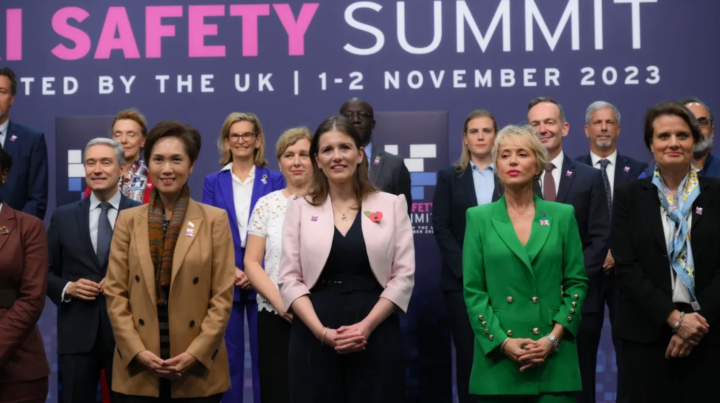Nigeria, along with 27 other nations worldwide, has taken a momentous step in the realm of artificial intelligence (AI) by endorsing the Bletchley Declaration. This historic agreement marks the world’s first initiative to establish a comprehensive understanding of the potential opportunities and risks associated with frontier AI and the imperative for governments to unite in confronting the most substantial challenges posed by this transformative technology.
The signing of the Bletchley Declaration took place at Bletchley Park in the United Kingdom, where leading AI nations convened for the inaugural AI Summit to address pressing concerns regarding AI’s implications and applications. Nigeria is actively participating in this pivotal event, represented by Dr. Bosun Tijani, the Minister of Communications and Digital Economy.
The signatories of this historic agreement comprise 28 nations from diverse regions, including Africa, the Middle East, Asia, and the European Union. These nations have come together to acknowledge the urgent need for a collective and coordinated approach in understanding and mitigating the potential risks associated with AI. Their shared commitment is to ensure that AI is developed and deployed in a manner that prioritizes safety and responsibility, ultimately benefiting the global community.

The Bletchley Declaration has successfully achieved key objectives set forth at the summit, fostering a shared consensus and accountability in relation to the risks and opportunities surrounding frontier AI. Moreover, it has paved the way for enhanced international cooperation in the realms of AI safety and research, particularly through an increased emphasis on scientific collaboration.
One of the primary concerns addressed by the declaration is the significant risks emanating from the misuse of AI, whether intentional or unintended. These risks are multifaceted, encompassing issues of cybersecurity, biotechnology, and the dissemination of misinformation. The participating countries have underscored the potential for serious, and even catastrophic, harm arising from the most advanced capabilities of AI models, be it through deliberate actions or unintentional consequences. Additionally, the declaration acknowledges that risks associated with frontier AI extend beyond its primary functionalities, including concerns related to bias and privacy.
In light of the acknowledgment that there remain risks and capabilities in the AI domain that are not fully understood, the signatory nations have committed to collaborating on a network of scientific research dedicated to frontier AI safety. This initiative aligns with the recent announcement by the UK Prime Minister, who unveiled plans to establish the world’s first AI Safety Institute. These efforts complement existing international endeavors, such as those within the G7, OECD, Council of Europe, United Nations, and the Global Partnership on AI. The objective is to leverage the best available scientific research to build an evidence-based foundation for managing AI-related risks while simultaneously unlocking the technology’s benefits.
Global leaders have been vocal in their support of this landmark agreement. UK Prime Minister Rishi Sunak emphasized the significance of comprehending AI risks, not only for the present but also for future generations. The UK has taken a leadership role in spearheading this global conversation, fostering international collaboration to ensure AI’s safety and potential benefits are realized for generations to come.
France has also expressed its endorsement of this collaborative effort. A spokesperson for the French Presidency lauded the international and cooperative work initiated by the AI Safety Summit to analyze, comprehend, and address the risks associated with certain frontier AI models. France has conveyed its readiness to actively participate in this long-term collective undertaking and is even willing to host the next in-person summit.
The Republic of Korea government is equally enthusiastic about this collective effort. They have declared their delight in co-hosting the mini-virtual summit and emphasized Korea’s leadership in AI technologies. The Republic of Korea recognizes the paramount importance of multilateral cooperation in ensuring that AI technologies are designed, utilized, and governed in safe and responsible ways.
The 28 countries that have affixed their signatures to the Bletchley Declaration include Australia, Brazil, Canada, Chile, China, the European Union, France, Germany, India, Indonesia, Ireland, Israel, Italy, Japan, Kenya, the Kingdom of Saudi Arabia, the Netherlands, Nigeria, the Philippines, the Republic of Korea, Rwanda, Singapore, Spain, Switzerland, Türkiye, Ukraine, the United Arab Emirates, the United Kingdom of Great Britain and Northern Ireland, and the United States of America. This diverse and extensive coalition reflects the global consensus on the importance of addressing the challenges and harnessing the potential of frontier AI through international cooperation.
In summary, the Bletchley Declaration stands as a historic milestone in the realm of AI, bringing together 28 nations from various parts of the world to address the risks and opportunities posed by frontier AI. The signatories have recognized the imperative of collective action to ensure that AI is developed and deployed in a responsible and secure manner, with a focus on maximizing the benefits for the entire global community. This collaborative effort marks a significant step towards understanding and managing the risks associated with AI and unlocking its transformative potential for the benefit of humanity.
Support InfoStride News' Credible Journalism: Only credible journalism can guarantee a fair, accountable and transparent society, including democracy and government. It involves a lot of efforts and money. We need your support. Click here to Donate
